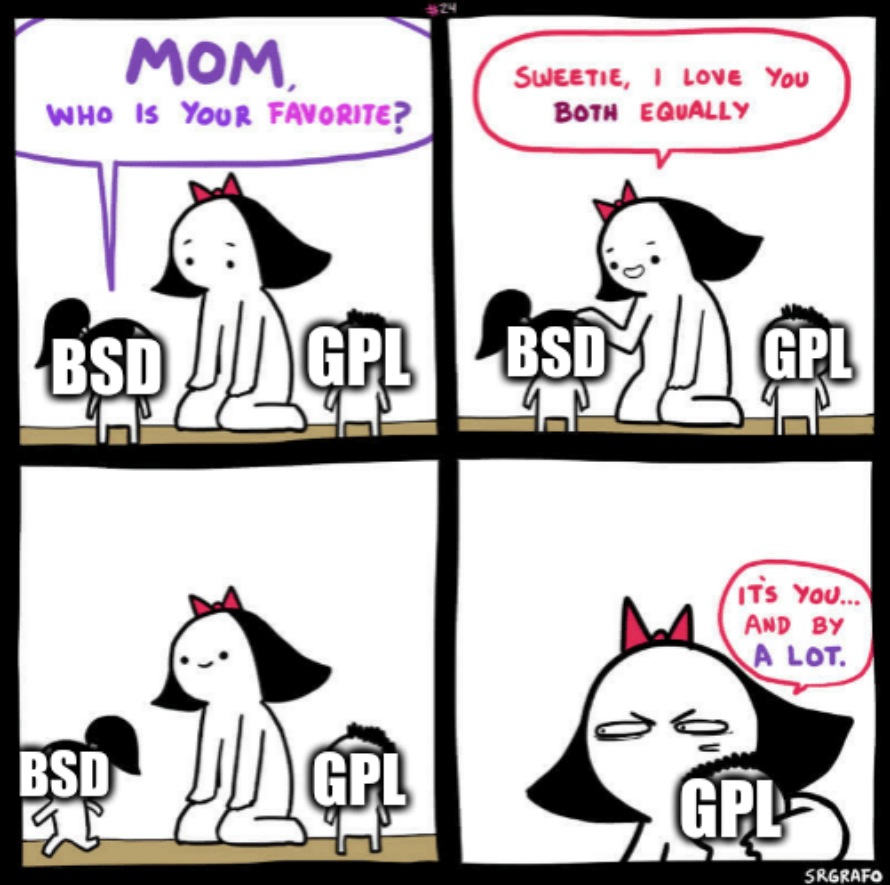this post was submitted on 28 Aug 2024
804 points (97.7% liked)
linuxmemes
25040 readers
1593 users here now
Hint: :q!
Sister communities:
Community rules (click to expand)
1. Follow the site-wide rules
- Instance-wide TOS: https://legal.lemmy.world/tos/
- Lemmy code of conduct: https://join-lemmy.org/docs/code_of_conduct.html
2. Be civil
- Understand the difference between a joke and an insult.
- Do not harrass or attack users for any reason. This includes using blanket terms, like "every user of thing".
- Don't get baited into back-and-forth insults. We are not animals.
- Leave remarks of "peasantry" to the PCMR community. If you dislike an OS/service/application, attack the thing you dislike, not the individuals who use it. Some people may not have a choice.
- Bigotry will not be tolerated.
3. Post Linux-related content
- Including Unix and BSD.
- Non-Linux content is acceptable as long as it makes a reference to Linux. For example, the poorly made mockery of
sudoin Windows. - No porn, no politics, no trolling or ragebaiting.
4. No recent reposts
- Everybody uses Arch btw, can't quit Vim, <loves/tolerates/hates> systemd, and wants to interject for a moment. You can stop now.
5. 🇬🇧 Language/язык/Sprache
- This is primarily an English-speaking community. 🇬🇧🇦🇺🇺🇸
- Comments written in other languages are allowed.
- The substance of a post should be comprehensible for people who only speak English.
- Titles and post bodies written in other languages will be allowed, but only as long as the above rule is observed.
6. (NEW!) Regarding public figures
We all have our opinions, and certain public figures can be divisive. Keep in mind that this is a community for memes and light-hearted fun, not for airing grievances or leveling accusations. - Keep discussions polite and free of disparagement.
- We are never in possession of all of the facts. Defamatory comments will not be tolerated.
- Discussions that get too heated will be locked and offending comments removed.
Please report posts and comments that break these rules!
Important: never execute code or follow advice that you don't understand or can't verify, especially here. The word of the day is credibility. This is a meme community -- even the most helpful comments might just be shitposts that can damage your system. Be aware, be smart, don't remove France.
founded 2 years ago
MODERATORS
you are viewing a single comment's thread
view the rest of the comments
view the rest of the comments

I read a story of someone that contributed to a BSD project, including fixes over some period of time, but later they ended up having to use a proprietary UNIX for work, that included their code, in a an intermediate, buggy state, but they were legally forbidden from applying their own bug fixes!
At the very least the GPL guarantees that if I am ever downstream of myself, I has fix my own damn mistakes and don't have to suffer them.
I am still willing to contribute to BSD stuff, but vastly prefer something like the AGPLv3.
So it's an argument against restrictive licenses? The more freedom the better? I mean Unix in this case had a too restrictive license?
What? GPL does not restrict freedom, it ensures its continued existence.
Read above please. You cannot import GPL code into BSD licensed code without restricting the code distribution. In the other direction, you can do it and just add a notice about the license. It does not add restrictions to the distribution. Otherwise Linux distributions wouldn't even have OpenSSH in base install images.
It's an argument against a license that permits relicensing under a more restrictive license. (E.g. BSD)
Of other software, yes. For example Linux distributions can use the BSD or MIT licensed code without any problems.
But it does not allow to remove the license from the software.
On the other hand GPL code cannot be imported into BSD code without introducing restrictions.